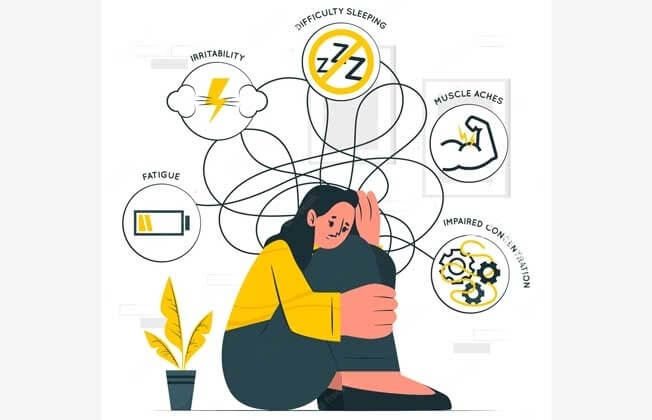Anxiety

Anxiety is the feeling of fear or nervousness that we all feel when faced with a problem or making an important decision. It is a normal emotion. However, when a person feels extremely anxious and the feeling lasts for long periods of time, he or she is said to be suffering from an anxiety disorder.
Anxiety disorder is a maladaptive response to stress. It is the constant worry & fear that keeps a person from carrying on with life normally.
How do you know if you have an anxiety disorder?
Anxiety can feel different for each person. While for some it is butterflies in the stomach, for others it is palpitations. Some may even feel a disconnect between body and mind. Some of the common signs & symptoms are:
- Panic, fear & uneasiness
- Sleep disorders
- Unable to stay still or calm
- Cold feet
- Palpitations
- Dry mouth
- Nauseas
- Tense muscles
- Shortness of breath
Why see a psychiatrist for anxiety disorder?
Interestingly, every individual’s reaction to stress and ability to cope with it depends on his/ her socio- cultural background and genetic proneness.
This means that symptom presentation, explanation of the illness and coping abilities of every individual is different. Only a qualified and experienced psychotherapist can understand the meaning and importance assigned by an individual to these symptoms and the socio-cultural factors driving it.
Besides trying to self manage anxiety disorder (eg: reading up on Google without seeking professional help) further accentuates anxiety.
Is anxiety disorder curable?
Developments in epidemiology and psychobiology have significantly advanced our understanding of the anxiety disorders in recent years. Advances in pharmacotherapy and psychotherapy of these disorders have brought realistic hope for relief of symptoms and improvement in functioning to many people.
What are the common symptoms of anxiety?
- Inability to concentrate
- Restlessness
- Thinking of the negative most outcome in most scenarios
- Exaggerated phobias (fear of heights, darkness etc.)
- Sudden shivering, dryness of mouth, giddiness, palpitations etc
- Many times anxiety presents with depression
What are some useful tips to cope up with anxiety?
- Cut down on caffeine, as it is a mood altering drug & tends to make symptoms of anxiety worse.
- Eat well balanced meals & make exercise a priority.
- Sleep disorders & anxiety tend to go hand in hand. Make sleep hygiene a priority.
- Maintain a positive attitude and accept that you cannot control everything.
- Understand your triggers.
Why Mindgram?
At Mindgram, we help you explore the possible causes, patterns & triggers of your anxiety. We develop tools & techniques to help you effectively manage stressful situations in the future.
Dr. Meghna is a trained psychotherapist with experience in treating various types of anxiety disorders.